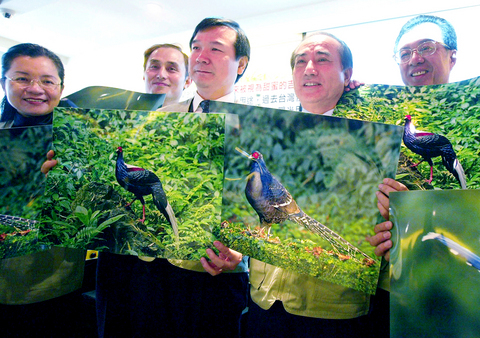A campaign to select a national bird by a nationwide poll officially kicked off in Taipei yesterday.
"Many countries have their own national birds," said Tien Chiu-chin (田秋堇), president of the campaign's sponsor, Taiwan Sustainable Ecological Society (TSES).
"For instance, the US has selected the bald eagle as its national bird," she said.

PHOTO: CNA
"With such a diverse ecology, it's a shame that we don't have a national bird," added Tien, who is also a Democratic Progressive Party legislator.
"The result of the poll will be confirmed by the legislature and become official," she said.
The campaign launch yesterday was also supported by several Cabinet ministries and various private businesses.
The organization is inviting everyone, especially children and young people, to participate in an online poll to choose a national bird for Taiwan.
The campaign, called the "Taiwan national bird election," has so far received 40,000 votes in early polling that began three days ago, the group said.
Online voting will run until the end of March.
"There are 15 rare species of bird that only exist in Taiwan which are very attractive to ecological tourists," said Legislative Speaker Wang Jin-pyng (
"Selecting a national bird may help the government's plan to double the number of tourists," he said.
Among the 15, the candidate birds are the Swinhoe's pheasant, the Formosan magpie, the Taiwan tit and the Mikado pheasant.
Wang, who was asked to cast the first ballot, voted for the Mikado pheasant.
"In the higher mountains, you can see Mikado pheasants walking sturdily and mightily, yet peacefully and relaxed out of the morning mist. It looks just like an emperor," Wang said, explaining his choice.
"It's similar to how Taiwan can be a leader in many areas," Wang said.
Wang said that the national bird should "represent the spirit and character of Taiwan."
"This is a soft display of national sovereignty," Tien said later, explaining the underlying aim of the campaign.
"Through the campaign we hope that children will learn more about, and be better able to relate to the land where they were born and raised," she added.
"The selection of a national bird will also promote national solidarity," Tien said, "such as when the bald eagle was endangered in the US and the entire nation stood united to save its national symbol."
Bald eagles were listed as endangered in 43 US states, but after conservation efforts were removed from the endangered species list in 1995, the US Fish and Wildlife Service said.
"After all, it will be good for the parliament of Taiwan to work on something beautiful together," Tien said.

GAINING STEAM: The scheme initially failed to gather much attention, with only 188 cards issued in its first year, but gained popularity amid the COVID-19 pandemic Applications for the Employment Gold Card have increased in the past few years, with the card having been issued to a total of 13,191 people from 101 countries since its introduction in 2018, the National Development Council (NDC) said yesterday. Those who have received the card have included celebrities, such as former NBA star Dwight Howard and Australian-South Korean cheerleader Dahye Lee, the NDC said. The four-in-one Employment Gold Card combines a work permit, resident visa, Alien Resident Certificate (ARC) and re-entry permit. It was first introduced in February 2018 through the Act Governing Recruitment and Employment of Foreign Professionals (外國專業人才延攬及雇用法),

CAUTION URGED: Xiaohongshu and Douyin — the Chinese version of TikTok — are tools the Chinese government uses for its ‘united front’ propaganda, the MAC said Mainland Affairs Council (MAC) Minister Chiu Chui-cheng (邱垂正) yesterday urged people who use Chinese social media platforms to be cautious of being influenced by Beijing’s “united front” propaganda and undermining Taiwan’s sovereignty. Chiu made the remarks in response to queries about Chinese academic Zhang Weiwei (張維為) saying that as young Taiwanese are fond of interacting on Chinese app Xiaohongshu (小紅書, known as RedNote in English), “after unification with China, it would be easier to govern Taiwan than Hong Kong.” Zhang is professor of international relations at Shanghai’s Fudan University and director of its China Institute. When giving a speech at China’s Wuhan

ENHANCE DETERRENCE: Taiwan has to display ‘fierce resolve’ to defend itself for China to understand that the costs of war outweigh potential gains, Koo said Taiwan’s armed forces must reach a high level of combat readiness by 2027 to effectively deter a potential Chinese invasion, Minister of National Defense Wellington Koo (顧立雄) said in an interview with the Chinese-language Liberty Times (sister newspaper of the Taipei Times) published yesterday. His comments came three days after US Secretary of State Marco Rubio told the US Senate that deterring a Chinese attack on Taiwan requires making a conflict “cost more than what it’s worth.” Rubio made the remarks in response to a question about US policy on Taiwan’s defense from Republican Senator John Cornyn, who said that Chinese

The zero emissions ship Porrima P111 was launched yesterday in Kaohsiung, showcasing the nation’s advancement in green technology, city Mayor Chen Chi-mai (陳其邁) said. The nation last year acquired the Swiss-owned vessel, formerly known as Turanor PlanetSolar, in a bid to boost Taiwan’s technology sector, as well as ecotourism in Palau, Chen said at the ship’s launch ceremony at Singda Harbor. Palauan President Surangel Whipps Jr and Minister of Foreign Affairs Lin Chia-lung (林佳龍) also attended the event. The original vessel was the first solar-powered ship to circumnavigate the globe in a voyage from 2010 to 2012. Taiwan-based Porrima Inc (保利馬) installed upgrades with